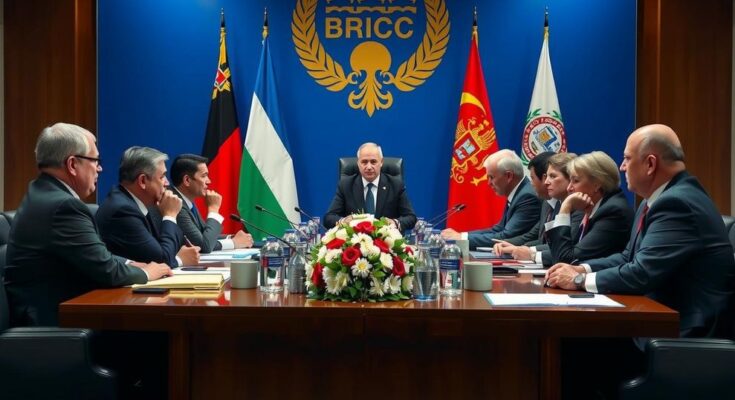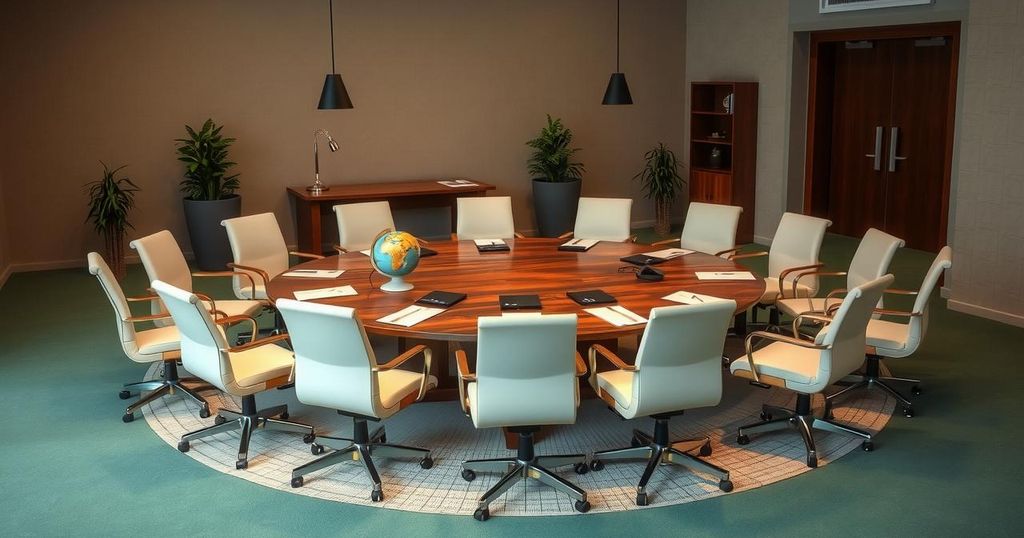At the Brics summit in Kazan, President Vladimir Putin hosted 36 world leaders as part of a strategic effort to counter his increasing isolation due to the Ukraine conflict. The summit emphasized Brics as a coalition of emerging economies seeking to establish dominance outside Western influence, particularly with regard to the US dollar. While the group expanded its membership, divergent views among nations could challenge unified objectives, yet the event showcased Russia as a vital player in a reconfigured international order.
Russian President Vladimir Putin has hosted 36 world leaders at the recent Brics summit in Kazan, representing a significant diplomatic effort amidst his growing international isolation due to the Ukraine conflict. The summit aims to reposition Russia on the global stage, presenting it as a vital player within a coalition that includes major countries such as China, India, and Iran. This gathering marks the largest assembly of foreign leaders in Russia since the onset of the Ukrainian invasion in February 2022. Amid speculation regarding the attendance of United Nations Secretary-General António Guterres, Moscow has expressed optimism about a broader representation from nations that share a stance counter to Western hegemony. In addition to the prominent leaders, representatives from Algeria, Azerbaijan, Indonesia, and Mexico are expected to participate. Notably, the summit also signals the expansion of the Brics group, which has grown from its original acronymic members to include nations such as Egypt, the United Arab Emirates, Ethiopia, and Iran. A critical objective for this coalition is to challenge the prevailing dominance of Western economies and the US dollar, which many member states perceive as a tool of coercion through sanctions. Iranian President Masoud Pezeshkian articulated this sentiment, stating that “Brics can be a way out of American totalitarianism and create a path of multilateralism. Brics can be a solution to deal with the dominance of the dollar and deal with the economic sanctions of countries.” However, the diversity of perspectives within Brics raises questions of ideological coherence. While nations like India and Brazil recognize the need to reduce dependence on the dollar, their motivations may not align as closely with those of Russia and China. Brazilian President Luiz Inácio Lula da Silva emphasized this point, insisting that Brics is “not against anyone.” Analysts suggest that the summit serves to bolster Putin’s image, countering narratives of Russia as an international pariah by casting it as a key player within a dynamic bloc poised to shape future global relations. Alex Gabuev of the Carnegie Russia Eurasia Centre remarked that the summit communicates that Russia is “far from being an international pariah but also is now a pivotal member of a dynamic group that will shape the future of the international order.” Putin’s absence from the previous summit in South Africa was a strategic choice to avoid the legal ramifications of an ICC warrant for his arrest. As international politics shift, the prospect of Donald Trump’s return to the White House and a potential easing of tensions regarding Ukraine could further influence the dynamics within Brics and beyond, prompting discussions about negotiations while Russia maintains control over substantial Ukrainian territories. Nevertheless, the foundational purpose of the Brics coalition remains less about security and more focused on creating an economic framework that sustains its member nations outside US influence. Despite amassing a GDP greater than either the G7 or the EU, Brics countries continue to grapple with limitations in their influence within international financial institutions due to historical voting structures that prioritize financial contributions. In summary, this summit is pivotal not only for Russia’s international standing but also for the collective ambition of member nations to redefine the geopolitical landscape and challenge Western economic dominance.
The article discusses the Brics summit hosted by Russian President Vladimir Putin, highlighting its significance in the context of Putin’s international isolation due to the ongoing conflict in Ukraine. The summit aims to showcase strength in numbers by including leaders from numerous emerging economies such as China, India, and Iran and is part of a broader effort to establish a counter-narrative against dominant Western powers. This meeting reflects not just the expansion of the Brics group but also its collective resistance against U.S. economic influence and sanctions, amid ongoing global tensions.
The Brics summit underscores an intentional move by Russia to exhibit its global relevance, despite ongoing isolation due to international sanctions and war-related accusations. It serves as a platform for emerging economies to collectively position themselves against Western financial systems and foster multilateral partnerships, even amidst cleavages in ideological alignment among members. The implications of this gathering could shape future geopolitical dynamics, particularly as member nations strategize on creating economic frameworks resilient to external pressures from dominant Western economies.
Original Source: www.theguardian.com




